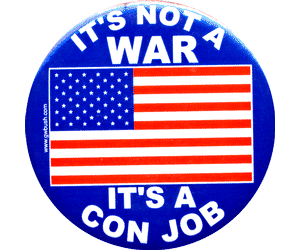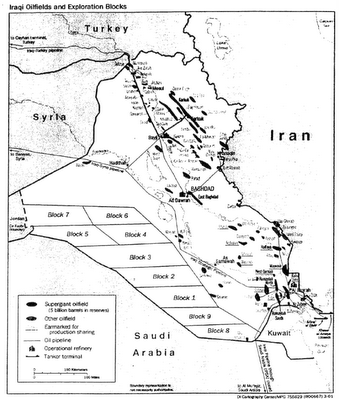Monday, January 8
It's Still About Oil: DC Dems' "Sell Out" of U.S. Voters Mandated by Iraqi Petro $Billions
 [T]he two parties should be almost identical, so that the American people can “throw the rascals out” at any election without leading to any profound or extensive shifts in policy. --US Historian Carroll Quigley, Tragedy and Hope: A History of the World in Our Time, discussing America's pseudo-two party system, 1966
[T]he two parties should be almost identical, so that the American people can “throw the rascals out” at any election without leading to any profound or extensive shifts in policy. --US Historian Carroll Quigley, Tragedy and Hope: A History of the World in Our Time, discussing America's pseudo-two party system, 1966Try this pop quiz on U.S. political diversity.
Question: What happened to Ralph Nader's 2004 independent presidential candidacy and a third competitive political party?
Answer: Legally harassed to extinction by the Democrat National Party
Like Republicans, Democrats enjoy exclusive perks attendant on a shop of restricted opportunities, to include narrowed chances of electoral defeat. Should it really be any surprise 99% in the House and 96% in the Senate who sought reelection in 2004 were returned to Washington. Should it really be any surprise that that more than one in four Capitol Hill legislators--one in three in the Senate--report assets making putting them among the exclusive 1% of Americans belonging to The Millionaire Club?
Like 9/11, it's all just a series of bumbling coincidences, right? Yes, hope and stupidity spring eternal.
So last November, American voters designated Demopublicans as Capitol Hill's new majority, i.e., they were given leadership of and subpoena power in both chambers. But even before they convened the 110th Congress earlier this month, the new boyz and girlz in charge betrayed voters' electoral mandate--to end the Iraq War and bring the troops home--sweeping them to power.
Incoming House Speaker Nancy Pelosi further suggested it was joining the GOP global crime spree. Among her first public statements was the conciliatory wink-and-nod she issued a crime-ridden White House in early December: "'We will not cut off funding' for Iraq."
So much for an investigation into the genesis of the Iraq War. Veteran congressman John Conyers (D-MI), Pelosi's designated House chair for the powerful Judiciary Committee who has sought to investigate the war's origins, affirmed her stand-down order. A week after her embarrassing concession on the war, Conyers imbued his years of post-9/11 regaling against White House criminality and contrived war Iraq War with a surreal aura reminiscent of studio wrestling; he told the Detroit News he had better things to do than hold the White House accountable.
Why the obvious betrayal of the electorate's anti-war mandate?
While Pelosi and Democratic Senate leader Harry Reid sent a letter to Bush last Friday affirming their opposition to sending more troops to Iraq, a British press report Monday revealed the missive was public posturing. According to the London Independent, the troop deployment virtually is assured by passage of an oil industry-drafted energy bill pending in the Iraqi parliament that will give a consortium of mostly US oil companies thirty years of unfettered access to Iraq's oil reserve.
A "Controverisal Law" Ignored by Corporate US Media
These are times of unprecedented American insanity and betrayal, a point underscored Monday by the Independent's empathic assessment of the Bush speechwriter tasked with concocting some patina of rationality for continuing the war in Iraq. Tomorrow night (Wednesday), according to the paper, the lame duck president with the lowest approval ratings of any predecessor is in need of some pithy turn of phrase to convince the American public to donate more sons and daughters for him to condemn down the rat hole of a hopeless war.
The art of presidential speechwriters is a testing one. But since Richard Nixon resigned over Watergate, has this unsung breed faced a greater challenge than composing the address George Bush is about to deliver on Iraq?
.... Every sign is that he will announce a "surge" in US forces of between 10,000 and 20,000, even though many of his top commanders oppose the idea - and even though, when it ejected the Republicans in November, the country was signaling it wanted not more, but fewer troops in Iraq, preferably none.
The paper characterized Bush's impending announcement to America's Heartland as a "desperately tough sell," one no doubt afforded new life after Pelosi, Coyers et al. recantedtheir pre-election party rhetoric of troop withdrawls.
 On Sunday (7 January), the London paper indicated Bush's speech will omit any mention of imminent Iraqi legislation on the fate of the oil fields, a development also absent from American TV and press reports.
On Sunday (7 January), the London paper indicated Bush's speech will omit any mention of imminent Iraqi legislation on the fate of the oil fields, a development also absent from American TV and press reports.Iraq’s massive oil reserves, the third-largest in the world, are about to be thrown open for large-scale exploitation by Western oil companies under a controversial law which is expected to come before the Iraqi parliament within days.
The US government has been involved in drawing up the law, a draft of which has been seen by The Independent on Sunday. It would give big oil companies such as BP, Shell and Exxon 30-year contracts to extract Iraqi crude and allow the first large-scale operation of foreign oil interests in the country since the industry was nationalised in 1972.
The huge potential prizes for Western firms will give ammunition to critics who say the Iraq war was fought for oil. They point to statements such as one from Vice-President Dick Cheney, who said in 1999, while he was still chief executive of the oil services company Halliburton, that the world would need an additional 50 million barrels of oil a day by 2010. “So where is the oil going to come from?… The Middle East, with two-thirds of the world’s oil and the lowest cost, is still where the prize ultimately lies,” he said.
Oil industry executives and analysts say the law, which would permit Western companies to pocket up to three-quarters of profits in the early years, is the only way to get Iraq’s oil industry back on its feet after years of sanctions, war and loss of expertise. But it will operate through “production-sharing agreements” (or PSAs) which are highly unusual in the Middle East, where the oil industry in Saudi Arabia and Iran, the world’s two largest producers, is state controlled.
Opponents say Iraq, where oil accounts for 95 per cent of the economy, is being forced to surrender an unacceptable degree of sovereignty.
With US Big Oil promoting a 30-year billion-dollar bonanza, the big question is this: how long after the voting booths closed on 7 November did it take Bush and Cheney to convince Democratic congressional leaders to forgo constituents' wishes and devise party strategy for retrenchment?
When the bill passes, the Dems are obligated to make more public show of cross-aisle opposition before publicly caving on their promise to withdraw American oil companies' pipeline security force deployed that, as we now know, will require their grandchildren's deployment in Iraq until 2037 to safeguard the "black gold" of foreign and domestic oil billionaires.
Old News, ol' Chap....Really
On 17 March 2005--the second anniversary of the White House's manipulated war in Iraq--US investigative journalist Greg Palast reported on that "controversial law" for the BBC's Newsnight, a work-up eerily reminiscence of discussions Dick Cheney and his constitutionally- challenged Energy Task Force (1) undoubtedly began days after the 2000 election.
From whistleblower Falah Aljibury, an Iraqi-born oil industry consultant who "interviewed successors to Saddam Hussein on behalf of the Bush administration," Palast learned "the US had a secret plan for Iraq's oil once Saddam had been conquered," one developed in conjunction with the US oil industry "'within weeks' of Bush's first taking office in 2001, long before the September 11th attack on the US" that even considered the contingency of a "forced coup d'etat."
Palast also determined the option finally signed off on by the US oil industry would generate obscene wealth (and gas prices) by creating a "state-owned" oil company that, as we now know, includes Iran and Saudi Arabia. According to Palast, Phillip Carroll, the former CEO of Shell Oil USA who headed Iraq oil production for the Bush White House after Saddam's fall, nixed an initial plan in 2003 to privatize (sell-off to the highest bidder) Iraq oil reserves.
 New plans, obtained from the State Department by Newsnight and Harper's Magazine under the US Freedom of Information act, called for creation of a state-owned oil company favored by the US oil industry. It was completed in January 2004, Harper's discovered, under the guidance of Amy Jaffe of the James Baker Institute in Texas. Former US Secretary of State Baker is now an attorney. His law firm, Baker Botts [2], is representing ExxonMobil and the Saudi Arabian government.
New plans, obtained from the State Department by Newsnight and Harper's Magazine under the US Freedom of Information act, called for creation of a state-owned oil company favored by the US oil industry. It was completed in January 2004, Harper's discovered, under the guidance of Amy Jaffe of the James Baker Institute in Texas. Former US Secretary of State Baker is now an attorney. His law firm, Baker Botts [2], is representing ExxonMobil and the Saudi Arabian government.Questioned by Newsnight, Ms Jaffe said the oil industry prefers state control of Iraq's oil over a sell-off because it fears a repeat of Russia's energy privatization. In the wake of the collapse of the Soviet Union, US oil companies were barred from bidding for the reserves.
Jaffe said "There is no question that an American oil company ... would not be enthusiastic about a plan that would privatize all the assets with Iraq companies and they (US companies) might be left out of the transaction."
In addition, Ms. Jaffe says US oil companies are not warm to any plan that would undermine Opec, "They [oil companies] have to worry about the price of oil."
"I'm not sure that if I'm the chair of an American company, and you put me on a lie detector test, I would say high oil prices are bad for me or my company."
The former Shell oil boss agrees. In Houston, he told Newsnight, "Many neo-conservatives are people who have certain ideological beliefs about markets, about democracy, about this that and the other. International oil companies without exception are very pragmatic commercial organizations. They don't have a theology."
As was the case with The Independent's coverage of the US's role in Iraq's oil heist, no US mainstream news story picked up Palast's bombshell scoop at the BBC.
Should patriotic Americans revive their Colonial forebears' pre-Revolutionary War slogan "No taxation without representation"? Don't bother. "Democracy" and the rule law now are dead in this country.
Long live Canada--and, if I'm lucky--long may I live there, too. It really is dangerous now to live here to risk being locked away as an dissident--an "enemy combatant"--under the Military Commissions Act of 2006, enacted three weeks before the November elections.
But that's another story, one I won't tell until I'm safely out of Fascism Central and in Canada.
Related Coverage: A three-part series on the fate of Iraq's oil appeared in October at Alternet.com (indicating Dems could have known before November's elections that bringing US troops home was not favored by the US oil industry). See Joshua Holland, "Bush's Petro-Cartle Almost Has Iraq Oil (Part 1)," Alternet.org, 16 October 2006; Joshua Holland, "Bush's Petrol-Cartel Almost Has Iraq Oil (Part 2)," Alternet.org, 17 October 2006. Alternet.org also reproduced The Independent's 7 January 2007 story here.
Notes/Postscript:
1. See especially "Foreign Suitors for Iraqi Oil Fields Contracts, dated "5 March 2001," Part 1 and 2, both in pdf file format. Even the Government Accountability Office joined in a lawsuit with Judicial Watch to force the Energy Task Force to release it cache of documents--until the agency withdrew after GOP House leaders threatened it with budget cuts. For additional perspective, read "Cheney's Energy Meetings, Iraq Oil and 9/11--A TVNL Reminder," which opens with the following paragraph:
The common sense question is this: How could Cheney include Iraq’s oil resources as part of our energy policy if we had no diplomatic or business relationship with them? Iraq was under sanctions. What business did Cheney have with Iraq’s energy infrastructure? No dealings with Iraq were possible unless something drastic were to happen, like an invasion and occupation. How could he have anticipated such a change when only an event like 9/11 would have made that possible?
2. Lest we forget, in 2003 the Baker Botts law firm contracted to represent three Iraqi Royal billionaires sued for material support of terrorism by families of 9/11 victims for $1 trillion. Although Michale Moore's 2004 documentary Fahrenheit 9/11 mercilessly pilloried James Baker and his Bush friends for extensive business connections to Saudi royalty, the firm pursued no legal action. "I think people pretty much understand anyone can string together words and video to make an impression, said Walter J. Smith, Baker Botts' managing partner. Right, right.
Motley Rice, lead counsel for the families, claims they have evidence proving Saudi royal involvement in 9/11.
"The Relief Commission, formed in 1993 by then-King Fahad bin Abdulaziz Al-Saud, was accused in the lawsuits of acting as a fully integrated component of al-Qaida's logistical and financial support infrastructure.
The plaintiffs had said that U.S. forces raided its Sarajevo branch in October 2001 and found computer hard drives with photographs of the World Trade Center before and after its collapse along with photos of two U.S. embassies in Africa that were bombed in 1998 and the USS Cole.
The plaintiffs also had alleged that U.S. forces found files on pesticides and crop dusters, the locations of Washington, D.C., government buildings, fake Department of State badges and cash."
The definitive collection of Saudi-Bush links to terrorism supporting claims in Moore's documentary was compiled 24 June 2004 by the Center for American Progress.
Nonetheless, Baker Botts convinced US District Judge Richard Casey to dismiss charges against the Saudi Royals (as well as pending charges in three other cases) declaring "sovereign immunity," i.e., that their role as state leaders exempted them from prosecution in foreign courts.











